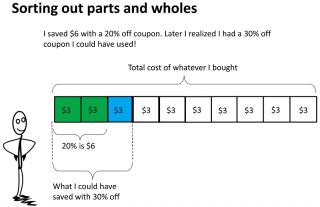
Singapore strips—also called bar models or tape diagrams—are a powerful tool for visualizing a wide variety of mathematical situations. Tape diagrams are explicitly mentioned in the College and Career Readiness Standards for Adult Education (CCRSAE) as a tool for reasoning with ratios, and they can be used for so much more. Through using them, students can improve their number sense, problem-solving skills, and confidence.
- Adult numeracy teachers at all levels of math experience and confidence
This professional development activity/course is designed for:
In this half-day training, you will get a taste of myriad uses of Singapore strips and have a chance to try your hand at them yourself. Come discover how learning to model with Singapore strips can help your students tackle everything from working with fractions and percents to solving word problems that might be found in an algebra textbook or on a high school equivalency test.
Learning to model quantities and relationships with Singapore strips can revolutionize teachers’ and students’ approaches to problem solving by empowering students to employ strategy and reasoning. According to Adding It Up: Helping Children Learn Mathematics, “Becoming strategically competent involves an avoidance of ‘number grabbing’ methods (in which the student selects numbers and prepares to perform arithmetic operations on them) in favor of methods that generate problem models (in which the student constructs a mental model of the variables and relations described in the problem)” (p. 124).[1]
According to Boaler et al. in Seeing as Understanding:The Importance of Visual Mathematics for our Brain and Learning (2016), “It seems possible that visual mathematics may contribute to equity, in valuing students’ thinking in different ways, as well as encouraging deep engagement, as we have found all students to be excited to see math ideas, and from there they have developed higher levels of understanding and performance.” (p. 10). Not only does her team suggest that visualizing math helps all students (including LD students) to better understand math concepts, they also found when teachers were given visual experiences they gain insights into mathematical concepts as well. [2]
[1] http://sabes.org/content/adding-it-helping-children-learn-mathematics-2001
[2]http://sabes.org/content/seeing-understanding-importance-visual-mathemat...
To receive a certificate of completion, participants must attend the entire face-to-face-session. For more information, please contact Sherry Soares (sherry_soares@terc.edu).
-
Draw Singapore strip models to represent quantities and relationships in mathematical situations, including word problems
Use Singapore strip models to reason about quantitative relationships in context
Make connections between modeling with Singapore strips and modeling with variables and equations
Upon completion of this professional development activity/course, you will be able to:
N/A
Quinsigamond Community College
670 W Boylston St, Harrington Learning Ctr, ROOM 239
Worcester, MA 01606
United States


